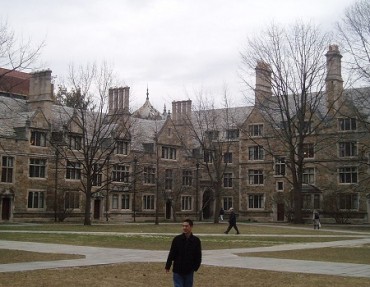
The Michigan Employee Relations Commission ruled earlier this week that the University of Michigan could not force graduate student research assistants to unionize, reaffirming a 1981 ruling that categorized GSRAs as students and not employees. The outcome was welcome news to Melinda Day, a graduate student researcher who objected to forcible unionization and implored MERC to intervene.
the University of Michigan could not force graduate student research assistants to unionize, reaffirming a 1981 ruling that categorized GSRAs as students and not employees. The outcome was welcome news to Melinda Day, a graduate student researcher who objected to forcible unionization and implored MERC to intervene.
“I am happy with the MERC ruling,” she said. “No GSRA will be forced to support a union even when that union provides very little to no benefits for that student.”
Last May, the Democrat-controlled U-M Board of Regents voted for the unionization of GSRAs. The decision was supported by the Graduate Employees Organization, a union that represents other U-M graduate students, but opposed by President Mary Sue Coleman.
Day’s opposition to joining GEO stemmed from personal experience. She previously worked for the university as a graduate student instructor, as required by her master’s degree program. Unlike GSRAs, who are primarily researchers, GSIs are teachers, and are unionized under GEO.
“We were then required to pay the GEO’s dues, even though our ultimate yearly stipend doesn’t change,” Day said.
For Day, the union wasn’t helpful, even when she worked as an instructor.
“It was a negative experience, because I was trying to stand up for myself,” she said. “I asked too many questions.”
She also felt that left-leaning political convictions formed the core of GEO’s activities.
“My interactions with them seemed to imply that the reason behind all of these things were political and ideological in nature,” she said. “They cover sex change operations. I can get a sex change operation but I can’t walk into a chiropractor’s office. It seems like they’re leaning toward that agenda, a political agenda, rather than seeing what’s best for a vast majority of their individuals.”
For these reasons, Day decided that she didn’t want to be involved with GEO. But the regents’ decision last May made it likely that GSRAs would also fall under union representation. This led Day to take a public role in opposing the union’s efforts.
“It really is a violation of one’s civil liberties, your freedom of association, to compel someone to financially support a union even when you don’t want to be part of it, just to be able to hold a job,” she said. “I couldn’t just stand by and watch it happen. So I did what I could.”
Her actions garnered animosity, but also support.
“I’ve gotten a lot of people telling me they don’t like what I’m doing but they still support not being unionized,” she said. “So it’s been kind of a mixed bag.”
One group that offered Day its support was the Mackinac Center for Public Policy, which filed a motion on her behalf asking MERC to disregard GEO’s petition for unionization. The motion cited a 1981 decision by MERC that had classified GSRAs as students, and as such, not suited to unionization under Michigan labor law.
MERC issued a 3-0 ruling Monday validating Day, the Mackinac Center, Coleman, and others who felt that GSRAs were ill-suited to union representation. Patrick Wright, director of the Mackinac Center’s Legal Foundation, praised the ruling.
“MERC enforced the law, rather than allowing a politically divided U of M Board of Regents to bypass it through a hasty resolution,” he said in a press release. “This resolution called for a public employee union election for a group of students who weren’t public employees in the first place. The regents have no legal authority to expand the statutory definition of public employees.”
Day was glad that she spoke out against the unionization of students. She said coercive unionization has always been a cause that is “near and dear to her heart.”
“The more people learn about the issue, the more people don’t want to be unionized,” she said.
Like The College Fix on Facebook.
Like The College Fix on Facebook / Follow us on Twitter





Please join the conversation about our stories on Facebook, Twitter, Instagram, Reddit, MeWe, Rumble, Gab, Minds and Gettr.